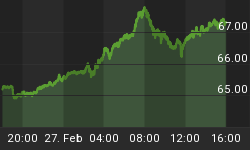The U.S. dollar is the global reserve currency. Should it be? If other central banks are going to fix their currencies to another currency, shouldn't that currency be associated with a relatively low rate of inflation? After all, a reserve currency is supposed to function as a store of value. The chart below shows the consumer inflation rates of the U.S., the U.K. and the Euro-zone calculated on the same basis - the so-called harmonized index of consumer prices (HICP). As you can see, the year-on-year inflation rate in the U.K. has tended to be the lowest of the three since December 1998 and the U.S. inflation rate has tended to be the highest. As of May, HICP inflation rate for the U.S. was 4.43%, for the Euro-zone 2.47% and for the U.K. 2.20%. From December 1997 through May 2006, the compound annual rate of HICP inflation for the U.K. has been 1.43%, for the Euro-zone 2.01% and for the U.S. 2.61%. Back in the good old days of the gold standard, the British pound was the reserve currency because the Bank of England managed monetary policy in such a way as to keep the pound price of an ounce of gold constant. So, if another country pegged the value of its currency to the pound, it effectively was "tying up" to a stationary anchor. By pegging its currency to the U.S. dollar now, a country is tying up to a dragging anchor. Why do you think the People's Bank of China (PBOC) is having to tighten monetary policy now? Because the U.S. dollar is dragging China into higher inflation - inflation in the original sense of the word, excess money creation. If the PBOC is serious about slowing Chinese money supply growth, it will have to be more reluctant to support the U.S. dollar vis a vis the yuan. The support entails the purchase of dollars with freshly-printed yuan. But the PBOC is trying to slow the growth in yuan, not increase it. Things could get very interesting in the second half of the year as the dollar starts to sink because of very soft real GDP growth and a Fed on hold.
Harmonized Index of Consumer Prices
(year-on-year percent change)















